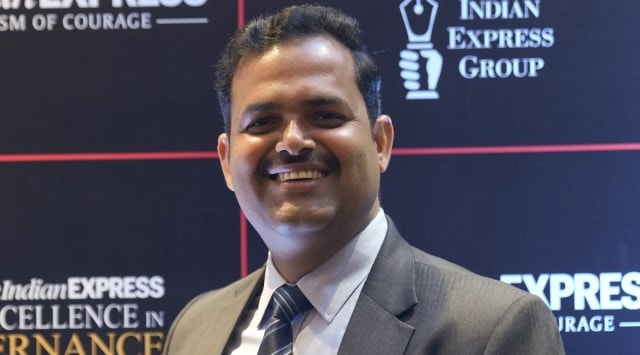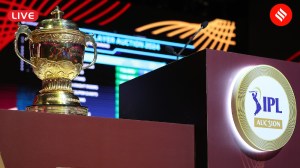With access as key, an MP district brings govt home to beneficiaries
While the groundwork — such as jan sunwais at the panchayat and tehsil levels — started from October 2021, the camps as part of the project were formally rolled out in 2022.
 Project Nidaan was implemented under Rohit Singh. (Express photo by Abhinav Saha)
Project Nidaan was implemented under Rohit Singh. (Express photo by Abhinav Saha) Eligible beneficiaries of a government scheme should be able to access it without hassles.
This was the basic premise of a project the district administration of Narsinghpur, in Madhya Pradesh, launched formally in 2022 to take the administration’s services to the people.
“As administrators, we can create an impact if we can ensure that everything (all government schemes) is implemented in letter and spirit. Unfortunately, that’s not really the case,” Rohit Singh, former District Collector of Narsinghpur, said.
And thus was born ‘Project Nidaan’. Singh, under whom the project was implemented last year, said that until then, the Collector’s officer received tens of applications to get even “basic issues” resolved — problems that should have ideally been “addressed at the lower levels by local-level officials, such as panchayat functionaries”. These were problems related to accessing pension, below poverty line (BPL) ration cards, Aadhaar cards, Ayushman cards, Pradhan Mantri Awas Yojana, water supply.
Project Nidaan ensured administration officials visited the panchayats concerned. While a “jan sunwai”, or public hearing, is usually held at one location in the district, getting people to assemble there and air their troubles, Nidaan was a sort of decentralised jan sunwai system, District Renewable Energy Officer Prabhat Kanoje, who was a nodal officer for the project, said.
While the groundwork — such as jan sunwais at the panchayat and tehsil levels — started from October 2021, the camps as part of the project were formally rolled out in 2022.
As part of Project Nidaan, the sub-divisional magistrate (SDM), tehsildars and panchayat-level officials addressed such applications every Tuesday and got them resolved, in addition to the jan sunwai at the district level. The status of these applications was then reviewed by the Collector at ‘time limit’ meetings every Monday.
A district-level officer was made in-charge of a panchayat; clusters of panchayats were formed, and camps were held one cluster at a time.
Anjana Tripathi, Deputy Director, Social Justice, who was one such nodal officer, said they would talk to people at these camps about their problems and try to resolve them. “There would be issues such as difficulty in getting a toilet built, or clearing a drain. In one instance we helped a resident procure a hearing aid,” she said.

Tripathi said more than 400 panchayats were covered in this way. Two camps were held in each panchayat — the first under the SDM and the second, 14 days later, under the Collector. Different officials were present at these camps to resolve issues and dispose of applications. “This meant that every panchayat was given 15 days to work, and by the time the Collector reached the panchayat, no applications should reach him,” Singh, among 19 winners of The Indian Express Excellence in Governance Awards for 2020 and 2021, said.
The biennial awards celebrate the finest work done by District Magistrates, women and men considered the foot soldiers of governance, as they script change that touches the lives of countless people across the country.
 The Indian Express Excellence in Governance Awards 2023
The Indian Express Excellence in Governance Awards 2023
Kamal Yadav, a resident of Dangidhana village in Narsinghpur who works in sugarcane fields, said one of these camps had helped him apply for a BPL ration card. “I had applied a few years ago, but it didn’t come through,” he said, alleging caste bias.
Dangidhana residents Dashrath Mehra, 35, and Hakkibai Chaudhary, 56, recalled that the Collector had visited last year, and “people went to him with their troubles”. “I remember him saying that their issues would be resolved,” Mehra said.
Chaudhary said she wanted to claim widow’s pension at the camp since her husband had not been around for over 15 years. But officials had told her that she could not claim pension without her husband’s death certificate.
Saurabh Sonawane, CEO, Zila Panchayat, Narsinghpur, said a statewide project — Mukhyamantri Jan Seva Abhiyaan — along similar lines was then launched in September and October 2022.







